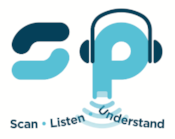Why don’t we use more Assistive Technology in Education?
Technology. It’s great. It’s huge. Even at my age (don’t ask) I feel naked if I don’t have my mobile with me. This technology has fantastic benefits for SEN students and this is called Assistive Technology. Helping SEND people live their life independently and breaking down barriers.
How much do we use in schools? In my experience, not a huge amount. Why not? “Cost and small budgets” I hear you shout at me. I know school budgets are limited, but is it actually all down to cost? Think about the cost of human support for SEN students – this isn’t cheap. Think about how much schools spend on improving results for students by employing consultants or paying for advice from specialist – again this is isn’t cheap. Schools are now providing whole year groups with tablets (computer things like iPads) and laptops – not cheap.
So if it isn’t all cost, what is it?
There are two main reasons (apart from cost) in my view. We are old. There it is. People in education are old. In technology terms/youth term we are old. We are behind the times. I’ve only just got the hang of my new television remote control and we’ve had it six months. I even get irritated when the supermarket moves things around so learning new technology doesn’t come easily to me.
Learning new technology is hard. I remember the days being excited I programmed the BBC microcomputer to play the first line of happy birthday (in the ten minutes I had on it). Doing stuff like that doesn’t excite me anymore. It I can’t use it straight away I am not really interested. And this takes me to the second reason. In education time is massively limited with many pressures so learning new technology is way down the list.
One of the companies I work for is Scanning Pens Ltd. They make assistive technology to help students turn text into speech. During this time I’ve heard educators say that they bought one but they haven’t had time to get it out of the box and give to students to use.
So there we are. I believecost, techno-phobe and time (and we are old) are the main barriers to Assistive Technology being used more in schools.
So what can we do? Well cost can be an issue – however, assistive technology comes with high rewards. Independent learning cuts down on the need for TAs/LSAs, less time requiring higher levels of support by the teacher and an evidenced increase in performance surely makes assistive technology cost effective?
So, techno-phobe educators and time limitations. Well give it to the students to investigate andwork out. Ask them to get involved. Who do we ask if we can’t use technology – I ask my kids! They have the capabilities and the desire. Also, look on You Tube, there are instructions videos on everything there!
So, go out there, see what’s around. There’s some amazing stuff that will give SEN students an independence for learning that is wonderfully liberating and will increase results. Independent learning also means less time needed from us so we can go and work out what on earth chatbots and augmented reality are (I googled the next big thing). Me, I’m gonna have lessons in how to put subtitles on my telly.




